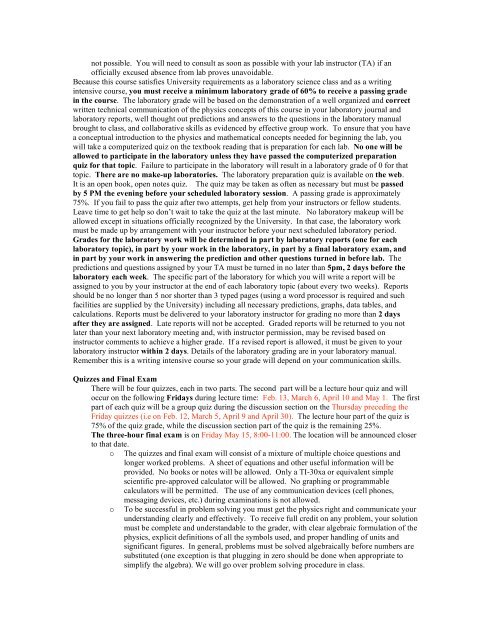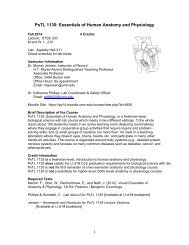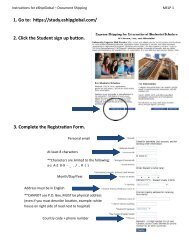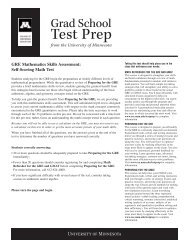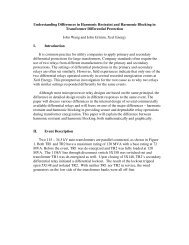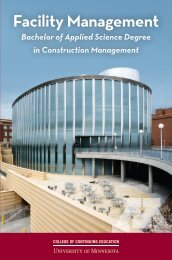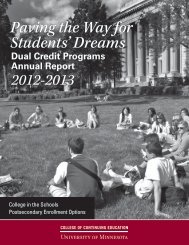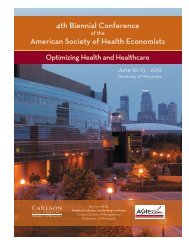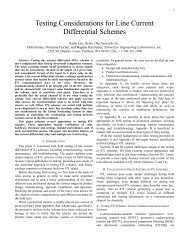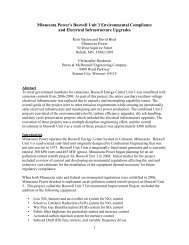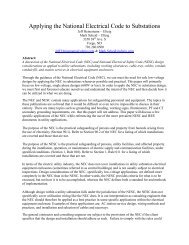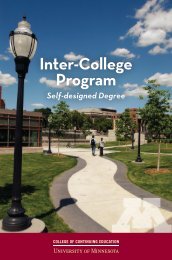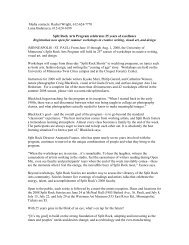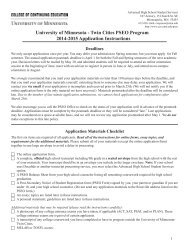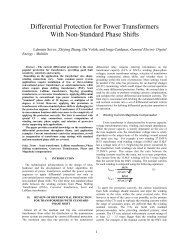Sample syllabus - College of Continuing Education - University of ...
Sample syllabus - College of Continuing Education - University of ...
Sample syllabus - College of Continuing Education - University of ...
Create successful ePaper yourself
Turn your PDF publications into a flip-book with our unique Google optimized e-Paper software.
not possible. You will need to consult as soon as possible with your lab instructor (TA) if an<br />
<strong>of</strong>ficially excused absence from lab proves unavoidable.<br />
Because this course satisfies <strong>University</strong> requirements as a laboratory science class and as a writing<br />
intensive course, you must receive a minimum laboratory grade <strong>of</strong> 60% to receive a passing grade<br />
in the course. The laboratory grade will be based on the demonstration <strong>of</strong> a well organized and correct<br />
written technical communication <strong>of</strong> the physics concepts <strong>of</strong> this course in your laboratory journal and<br />
laboratory reports, well thought out predictions and answers to the questions in the laboratory manual<br />
brought to class, and collaborative skills as evidenced by effective group work. To ensure that you have<br />
a conceptual introduction to the physics and mathematical concepts needed for beginning the lab, you<br />
will take a computerized quiz on the textbook reading that is preparation for each lab. No one will be<br />
allowed to participate in the laboratory unless they have passed the computerized preparation<br />
quiz for that topic. Failure to participate in the laboratory will result in a laboratory grade <strong>of</strong> 0 for that<br />
topic. There are no make-up laboratories. The laboratory preparation quiz is available on the web.<br />
It is an open book, open notes quiz. The quiz may be taken as <strong>of</strong>ten as necessary but must be passed<br />
by 5 PM the evening before your scheduled laboratory session. A passing grade is approximately<br />
75%. If you fail to pass the quiz after two attempts, get help from your instructors or fellow students.<br />
Leave time to get help so don’t wait to take the quiz at the last minute. No laboratory makeup will be<br />
allowed except in situations <strong>of</strong>ficially recognized by the <strong>University</strong>. In that case, the laboratory work<br />
must be made up by arrangement with your instructor before your next scheduled laboratory period.<br />
Grades for the laboratory work will be determined in part by laboratory reports (one for each<br />
laboratory topic), in part by your work in the laboratory, in part by a final laboratory exam, and<br />
in part by your work in answering the prediction and other questions turned in before lab. The<br />
predictions and questions assigned by your TA must be turned in no later than 5pm, 2 days before the<br />
laboratory each week. The specific part <strong>of</strong> the laboratory for which you will write a report will be<br />
assigned to you by your instructor at the end <strong>of</strong> each laboratory topic (about every two weeks). Reports<br />
should be no longer than 5 nor shorter than 3 typed pages (using a word processor is required and such<br />
facilities are supplied by the <strong>University</strong>) including all necessary predictions, graphs, data tables, and<br />
calculations. Reports must be delivered to your laboratory instructor for grading no more than 2 days<br />
after they are assigned. Late reports will not be accepted. Graded reports will be returned to you not<br />
later than your next laboratory meeting and, with instructor permission, may be revised based on<br />
instructor comments to achieve a higher grade. If a revised report is allowed, it must be given to your<br />
laboratory instructor within 2 days. Details <strong>of</strong> the laboratory grading are in your laboratory manual.<br />
Remember this is a writing intensive course so your grade will depend on your communication skills.<br />
Quizzes and Final Exam<br />
There will be four quizzes, each in two parts. The second part will be a lecture hour quiz and will<br />
occur on the following Fridays during lecture time: Feb. 13, March 6, April 10 and May 1. The first<br />
part <strong>of</strong> each quiz will be a group quiz during the discussion section on the Thursday preceding the<br />
Friday quizzes (i.e on Feb. 12, March 5, April 9 and April 30). The lecture hour part <strong>of</strong> the quiz is<br />
75% <strong>of</strong> the quiz grade, while the discussion section part <strong>of</strong> the quiz is the remaining 25%.<br />
The three-hour final exam is on Friday May 15, 8:00-11:00. The location will be announced closer<br />
to that date.<br />
o The quizzes and final exam will consist <strong>of</strong> a mixture <strong>of</strong> multiple choice questions and<br />
longer worked problems. A sheet <strong>of</strong> equations and other useful information will be<br />
provided. No books or notes will be allowed. Only a TI-30xa or equivalent simple<br />
scientific pre-approved calculator will be allowed. No graphing or programmable<br />
calculators will be permitted. The use <strong>of</strong> any communication devices (cell phones,<br />
messaging devices, etc.) during examinations is not allowed.<br />
o To be successful in problem solving you must get the physics right and communicate your<br />
understanding clearly and effectively. To receive full credit on any problem, your solution<br />
must be complete and understandable to the grader, with clear algebraic formulation <strong>of</strong> the<br />
physics, explicit definitions <strong>of</strong> all the symbols used, and proper handling <strong>of</strong> units and<br />
significant figures. In general, problems must be solved algebraically before numbers are<br />
substituted (one exception is that plugging in zero should be done when appropriate to<br />
simplify the algebra). We will go over problem solving procedure in class.


